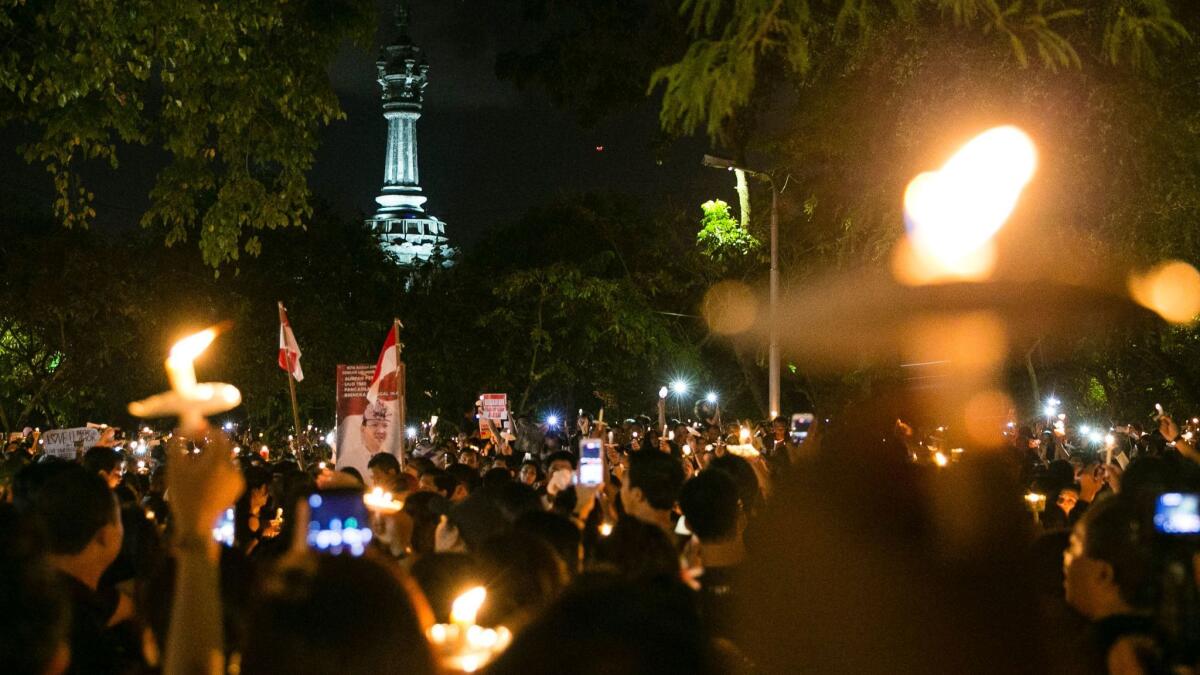Editorial: Blasphemy laws are an unholy offense against free speech. And they’re spreading

Indonesia and Ireland are very different societies, but in both countries talking about religion can get you in trouble with the law.
On Tuesday, the Christian governor of Jakarta, the Indonesian capital, was sentenced to two years in prison for blasphemy against Islam, a penalty that shocked many inhabitants of the majority-Muslim country known for its tolerance and pluralism. The blasphemy charge against Basuki “Ahok” Tjahaja Purnama was based on a video in which he was recorded telling voters they were being misled if they believed that a verse in the Koran forbade them from voting for a non-Muslim.
On the other side of the world, the British writer and actor Stephen Fry is breathing easier after officials in Ireland announced that they wouldn’t charge him for violating that nation’s blasphemy law for joking in a 2015 television interview that God, if he existed, was “quite clearly a maniac.”
But the police had investigated Fry under the law, which, far from being a relic, was enacted in 2009. The law makes it illegal to utter or publish any material “grossly abusive or insulting in relation to matters held sacred by any religion” in which the intent and result is “outrage among a substantial number of the adherents of that religion.”
That language echoes a resolution passed by the United Nations Human Rights Council in 2010 calling on nations to “combat defamation of all religions,” the culmination of a long-standing campaign led predominantly by Muslim nations to have the international community equate “defamation of religion” with “discrimination against religion.”
Fortunately, more recent pronouncements by the U.N. have shown a greater appreciation for the importance of freedom of speech even while condemning behavior that is intolerant of religion. Yet many nations still have blasphemy laws on the books. Last year, Heiner Bielefeldt , the U.N.’s special investigator on freedom of religion, called for the universal repeal of such laws, saying they restrict freedom of expression and promote intolerance toward minority religions.
That conclusion also has been reached by independent researchers. A 2010 study by Freedom House, a Washington-based human rights organization, examined laws against blasphemy and religious insults in Algeria, Egypt, Greece, Indonesia, Malaysia, Pakistan and Poland. In general, the study found, the laws protected the majority faith. They also were used to target journalists, artists and political dissidents.
These laws should be repealed, even if they were enacted not for the traditional reason — to show reverence to a deity — but for the supposedly more progressive purpose of sparing the sensitivities of believers, including members of minority faiths.
Redefining blasphemy laws as laws against “hate speech” don’t make them any more acceptable or any less susceptible to abuse and selective enforcement.
Follow the Opinion section on Twitter @latimesopinionand Facebook
More to Read
A cure for the common opinion
Get thought-provoking perspectives with our weekly newsletter.
You may occasionally receive promotional content from the Los Angeles Times.










